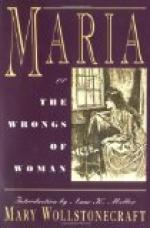“Having settled my father’s affairs, and, by my exertions in his favour, made my brother my sworn foe, I returned to London. My husband’s conduct was now changed; I had during my absence, received several affectionate, penitential letters from him; and he seemed on my arrival, to wish by his behaviour to prove his sincerity. I could not then conceive why he acted thus; and, when the suspicion darted into my head, that it might arise from observing my increasing influence with my uncle, I almost despised myself for imagining that such a degree of debasing selfishness could exist.
“He became, unaccountable as was the change, tender and attentive; and, attacking my weak side, made a confession of his follies, and lamented the embarrassments in which I, who merited a far different fate, might be involved. He besought me to aid him with my counsel, praised my understanding, and appealed to the tenderness of my heart.
“This conduct only inspired me with compassion. I wished to be his friend; but love had spread his rosy pinions and fled far, far away; and had not (like some exquisite perfumes, the fine spirit of which is continually mingling with the air) left a fragrance behind, to mark where he had shook his wings. My husband’s renewed caresses then became hateful to me; his brutality was tolerable, compared to his distasteful fondness. Still, compassion, and the fear of insulting his supposed feelings, by a want of sympathy, made me dissemble, and do violence to my delicacy. What a task!
“Those who support a system of what I term false refinement, and will not allow great part of love in the female, as well as male breast, to spring in some respects involuntarily, may not admit that charms are as necessary to feed the passion, as virtues to convert the mellowing spirit into friendship. To such observers I have nothing to say, any more than to the moralists, who insist that women ought to, and can love their husbands, because it is their duty. To you, my child, I may add, with a heart tremblingly alive to your future conduct, some observations, dictated by my present feelings, on calmly reviewing this period of my life. When novelists or moralists praise as a virtue, a woman’s coldness of constitution, and want of passion; and make her yield to the ardour of her lover out of sheer compassion, or to promote a frigid plan of future comfort, I am disgusted. They may be good women, in the ordinary acceptation of the phrase, and do no harm; but they appear to me not to have those ‘finely fashioned nerves,’ which render the senses exquisite. They may possess tenderness; but they want that fire of the imagination, which produces active sensibility, and positive virtue. How does the woman deserve to be characterized, who marries one man, with a heart and imagination devoted to another? Is she not an object of pity or contempt, when thus sacrilegiously violating the purity of her own feelings? Nay,




